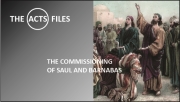 The first few verses of Acts 13 provide us a rare glimpse into the early church of Antioch. The first is that it had two official offices, namely teachers (pastors) and prophets. There is no indication that deacons or elders were yet appointed.
The first few verses of Acts 13 provide us a rare glimpse into the early church of Antioch. The first is that it had two official offices, namely teachers (pastors) and prophets. There is no indication that deacons or elders were yet appointed.
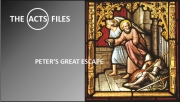 At the start of Acts 12 we are given a few details of the death of James, son of Zebedee. As the apostle John’s older brother he was one only three to witness Jesus’ transfiguration on the mount. James was one of the first disciples called by Jesus and the first to be martyred (Stephen was a deacon, and while he was a follower of Jesus was not one of the 12). His mother and father were people with means and owned a few fishing vessels. This is likely one reason Jesus asked John to care for his mother shortly before his death.
At the start of Acts 12 we are given a few details of the death of James, son of Zebedee. As the apostle John’s older brother he was one only three to witness Jesus’ transfiguration on the mount. James was one of the first disciples called by Jesus and the first to be martyred (Stephen was a deacon, and while he was a follower of Jesus was not one of the 12). His mother and father were people with means and owned a few fishing vessels. This is likely one reason Jesus asked John to care for his mother shortly before his death.
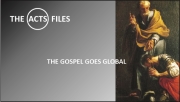 The history unfolding in Acts 10.1-11.18 reads simply enough, but is of great importance. There is far more to learn than a simple reading permits. Yes, Cornelius is visited by an Angel, and Peter receives a vision, the gospel is received by many and Peter squares it all with the other apostles in Jerusalem. What else is there to learn?
The history unfolding in Acts 10.1-11.18 reads simply enough, but is of great importance. There is far more to learn than a simple reading permits. Yes, Cornelius is visited by an Angel, and Peter receives a vision, the gospel is received by many and Peter squares it all with the other apostles in Jerusalem. What else is there to learn?
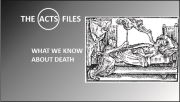 After reading the account of the first person raised from the dead (in the book of Acts) it seems like a good place to stop and discuss what this means and what death is all about. There are a total of nine accounts in the Bible about people being raised from death (the full list is below). We won’t take the time to examine each one, though that would be an interesting study we might take up at a later time, but there is much to be learned from examining the accounts as a whole.
After reading the account of the first person raised from the dead (in the book of Acts) it seems like a good place to stop and discuss what this means and what death is all about. There are a total of nine accounts in the Bible about people being raised from death (the full list is below). We won’t take the time to examine each one, though that would be an interesting study we might take up at a later time, but there is much to be learned from examining the accounts as a whole.
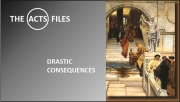 With Peter running from the law, Luke turns to the reaction of the authorities to Peter’s escape, and it’s not a pleasant one. The soldiers guarding Peter’s cell were the first to notice his absence. When word reached Herod he ordered a careful search for Peter and, when not found, ordered the execution of the guards. Four men died that day instead of Peter. Dismayed that his public spectacle could not proceed, Herod left town to reside at the palace in Caesarea-Maritima.
With Peter running from the law, Luke turns to the reaction of the authorities to Peter’s escape, and it’s not a pleasant one. The soldiers guarding Peter’s cell were the first to notice his absence. When word reached Herod he ordered a careful search for Peter and, when not found, ordered the execution of the guards. Four men died that day instead of Peter. Dismayed that his public spectacle could not proceed, Herod left town to reside at the palace in Caesarea-Maritima.
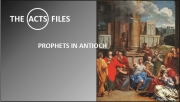 The events recorded in Acts 11.27-.30 is one of the most historically attested passages in the New Testament. There were many famines that rolled across the Roman Empire between 45 to 48 AD during the reign of Emperor Tiberius Claudius Nero Germanicus (known by all as simply "Claudius"). The famine referred to here was in the earlier part of that time frame and was mentioned by Josephus in his book Antiquities XX.
The events recorded in Acts 11.27-.30 is one of the most historically attested passages in the New Testament. There were many famines that rolled across the Roman Empire between 45 to 48 AD during the reign of Emperor Tiberius Claudius Nero Germanicus (known by all as simply "Claudius"). The famine referred to here was in the earlier part of that time frame and was mentioned by Josephus in his book Antiquities XX.
 A few readers of this site wrote and asked if the Bible itself made a distinction between raing the dead and resurrecting the dead. Congratulations to them for thinking like Berean! In fact, the Bible does make such a distinction in the language it uses. The clearest distinction is found in Matthew 27.52-.53. I’ll quote the passage below replacing the English words with the Greek to illustrate the difference.
A few readers of this site wrote and asked if the Bible itself made a distinction between raing the dead and resurrecting the dead. Congratulations to them for thinking like Berean! In fact, the Bible does make such a distinction in the language it uses. The clearest distinction is found in Matthew 27.52-.53. I’ll quote the passage below replacing the English words with the Greek to illustrate the difference.
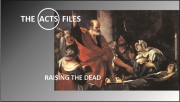 Following the third progress report the narrative then switches from Saul to Peter, and from Caesarea-Maritima to Lydda, in closing out chapter 9. In Lydda Peter heals a man named Aeneas in a humorous fashion. The man had been paralyzed for nearly a decade and confined to his bed. The man had been paralyzed for nearly a decade and confined to his bed. It is clear the man is a believer as he is referenced as being among the “saints” of the city. What does one say to a man confined to his bed for eight years? “Get up and make your own bed”, of course.
Following the third progress report the narrative then switches from Saul to Peter, and from Caesarea-Maritima to Lydda, in closing out chapter 9. In Lydda Peter heals a man named Aeneas in a humorous fashion. The man had been paralyzed for nearly a decade and confined to his bed. The man had been paralyzed for nearly a decade and confined to his bed. It is clear the man is a believer as he is referenced as being among the “saints” of the city. What does one say to a man confined to his bed for eight years? “Get up and make your own bed”, of course.
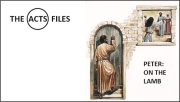 Once Peter realized his escape was for real he fled to the home of a friend, John Mark. Perhaps he fled there because it was close (most likely), or because he was aware of the prayer meeting happening there, either way it was a place of safety which he desperately needed.
Once Peter realized his escape was for real he fled to the home of a friend, John Mark. Perhaps he fled there because it was close (most likely), or because he was aware of the prayer meeting happening there, either way it was a place of safety which he desperately needed.
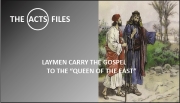 Due to the persecution that broke out over Stephen’s execution (chapter 7) many Jesus-following Jews left Jerusalem for friendlier shores. Some of those friendly shores included Phoenicia (a region north of Israel), Cyprus (a large island off the coast of Israel) and even as far north as Antioch in Syria.
Due to the persecution that broke out over Stephen’s execution (chapter 7) many Jesus-following Jews left Jerusalem for friendlier shores. Some of those friendly shores included Phoenicia (a region north of Israel), Cyprus (a large island off the coast of Israel) and even as far north as Antioch in Syria.
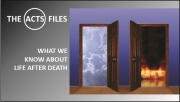 One of the most intriguing aspects of death is just how complex the whole thing is, and it could be even more complicated if we were to delve into what death was like before the resurrection of Jesus. So convoluted were some of the details, I found it easier to understand by diagramming just what can happen to a spirit on this side of the empty tomb.
One of the most intriguing aspects of death is just how complex the whole thing is, and it could be even more complicated if we were to delve into what death was like before the resurrection of Jesus. So convoluted were some of the details, I found it easier to understand by diagramming just what can happen to a spirit on this side of the empty tomb.
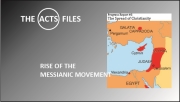 Once in Jerusalem Saul did not return to the Temple, or even home. His first stop was to find the apostles. They did not receive him, however, fearing like those in Damascus that this was some form of trap. Barnabus decided that rather than allowing Saul into the presence of all the disciples, he would meet with Saul and determine the former persecutor’s intentions.
Once in Jerusalem Saul did not return to the Temple, or even home. His first stop was to find the apostles. They did not receive him, however, fearing like those in Damascus that this was some form of trap. Barnabus decided that rather than allowing Saul into the presence of all the disciples, he would meet with Saul and determine the former persecutor’s intentions.

